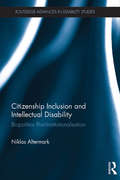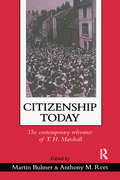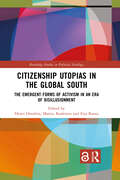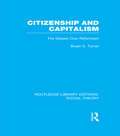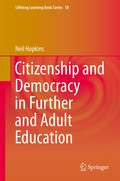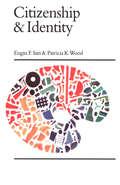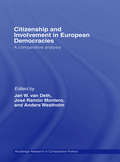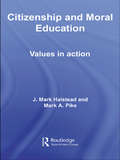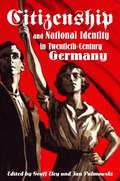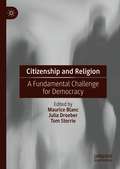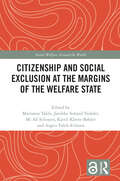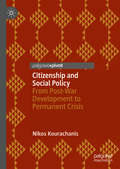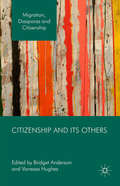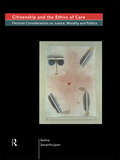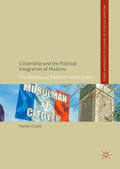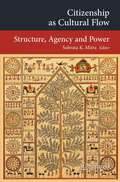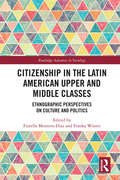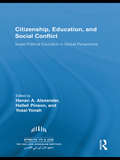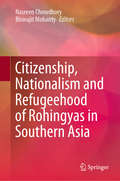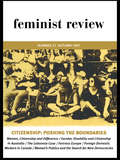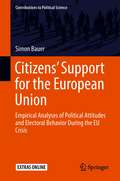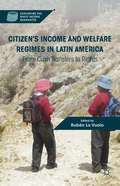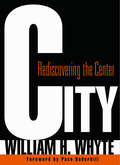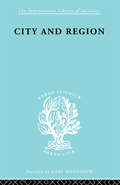- Table View
- List View
Citizenship Inclusion and Intellectual Disability: Biopolitics Post-Institutionalisation (Routledge Advances in Disability Studies)
by Niklas AltermarkWhat happens when a group traditionally defined as lacking the necessary capacities of citizenship is targeted by government programs that have made ‘citizenship inclusion’ their main goal? Combining theoretical perspectives of political philosophy, social theory, and disability studies, this book untangles the current state of Western intellectual disability politics following the replacement of state institutionalisation by independent and supported living, individual rights, and self-determination. Taking its cue from Foucault’s conception of ‘biopolitics’, denoting the government of the individuals and the totality of the population, its overarching argument is that the ambiguous positioning of people with intellectual disabilities with respect to the ideals of citizenship results in a regime of government that simultaneously includes and excludes people of this group. On the one hand, its members are projected to become ideal-citizens via the cultivation of citizenship capacities. On the other, the right to live independently and by their own choices is curtailed as soon as they are seen as failing with respect to the ideals of reason and rationality. Therefore, coercion, restraints, and paternalism, which were all supposed to end with deinstitutionalisation, are still ingrained in services targeting the group. In equal parts a theoretical work, advancing debates of critical disability theory, social theory, and post-structural philosophy, as well as an empirical engagement with the history of intellectual disability politics and the ways in which present day politics target the group, this book will be of interest to all students and scholars of disability studies, disability politics, and political theory.
Citizenship Today: The Contemporary Relevance Of T.H. Marshall
by Anthony M. Rees Martin BulmerThe contributors apply Marshall's dominant conception of citizenship to key areas of social scientific study such as power, income distribution, work and technology, family responsibilities, the environment and the underclass. The book is intended for undergraduate and postgraduate students on courses in sociological theory, social inequality, social policy and political theory.
Citizenship Utopias in the Global South: The Emergent Forms of Activism in an Era of Disillusionment (Routledge Studies in Political Sociology)
by Henri OnoderaCitizenship Utopias in the Global South is an edited collection of empirical research that explores emergent forms of activism in Africa, Asia, and Latin America in times of multiple crises. At the intersection of hope and disillusionment, the diverse and thought-provoking chapters investigate emerging forms of activism in the Global South – including youth activisms, anti-racism struggles, feminist initiatives, online dissent, and Indigenous movements.In the 2020s, many parts of the world are witnessing contradictory processes of popular claims to rights, livelihoods, and social justice, and subsequent forms of populist authoritarianism and the securitization of civil society. Previously hopeful calls for dignity, democracy, and social justice – through protesting, strikes, civil society campaigns, legal reforms, and elections, for example – have been met with disdain and civic disengagement. This book investigates the re-imagination and pursuit of citizen activism in such times of popular disillusionment. It explores citizenship utopias as social imaginaries that are enacted and that articulate an ideal social order or democratic polity with ideal forms of experiencing citizenship. Its chapters interrogate conventional approaches to citizenship by introducing a nuanced and empirically grounded exploration of the complex ways in which people experience, negotiate, and engage in the societal changes that they aspire towards. The examination of citizenship utopias outlines contemporary signals for transformative futures and their possibilities.The book undertakes a fresh effort at contributing to the shifting terrain of critical development studies, political anthropology, political sociology, and decolonising scholarship by engaging in discussions about citizenship, activism, disillusionment, and future societal alternatives in times of multiple global challenges.The Open Access version of this book, available at www.taylorfrancis.com, has been made available under a Creative Commons Attribution (CC-BY) 4.0 license.
Citizenship and Capitalism: The Debate over Reformism (Routledge Library Editions: Social Theory #Vol. 21)
by Bryan S. TurnerIn this study of politics in capitalist society Bryan Turner explores the development of citizenship as a way of demonstrating the effective use of political institutions by the working class and other subordinate groups to promote their interests. Marxist criticisms of reformism are rejected; it is shown that subordinate groups can achieve significant advances in social and economic rights, and that democracy is not a sham but a necessary mechanism for the pursuit of interests.
Citizenship and Democracy in Further and Adult Education (Lifelong Learning Book Series #18)
by Neil HopkinsThis book addresses the questions why citizenship education is an important subject for students in further and adult education and why we need democratic colleges to support the study of citizenship education. It investigates the historical roots of further and adult education and identifies how the adoption of citizenship education in the post-compulsory sector can enrich vocational studies in further education and programmes in adult education. It is argued that democratic colleges are vital to ensure that citizenship education informs the decision-making process throughout educational institutions (and as a means of establishing fair and equal representation for important stakeholders). The author has worked in both sectors for over a decade, and uses this experience to offer a blend of educational practice and philosophical investigation. The result is a work that appeals to both teachers in further and adult education as well as academics and students interested in philosophy of education.
Citizenship and Identity (Politics and Culture series)
by Engin F. Isin Patricia K. WoodThrough a detailed introductory discussion of the relation between the civil and the political, and between recognition and representation, this book provides a comprehensive vocabulary for understanding citizenship. It uses the work of T H Marshall to frame the critical interrogation of how ethnic, technological, ecological, cosmopolitan, sexual and cultural rights relate to citizenship. The authors show how the civil, political and social meanings of citizenship have been redefined by postmodernization and globalization.
Citizenship and Involvement in European Democracies: A Comparative Analysis (Routledge Research in Comparative Politics #Vol. 17)
by Jan W. van Deth José Ramón Montero Anders WestholmThis unique study presents the results of a cross-national analysis of citizenship and participation among citizens in twelve European democracies. Research on the future and quality of contemporary democracy is usually restricted to focus either on political participation, on particular aspects of citizenship, or on social activities, exclusively. This new book offers the first empirical investigation of the relationships both between social and political involvement, and between ‘small-scale’ and ‘large-scale’ democracies. Citizenship and Involvement in European Democracies offers representative samples of the populations in a selection of European countries between 2000-2002, including: Denmark, Germany (East and West), Moldova, the Netherlands, Norway, Portugal, Romania, Russia, Slovenia, Spain, Sweden, and Switzerland. The leading contributors provide new theoretical insights and offer a broad conceptualization of citizenship, stimulating the ongoing discussions about the problems and challenges of democratic political systems. This book has a companion volume entitled Social Capital and Associations in European Democracies edited by William A. Maloney and Sigrid Roßteutscher (Routledge, 2006). Both volumes will be of great interest to students and researchers of European politics, comparative politics and sociology.
Citizenship and Moral Education: Values in Action
by Mark Halstead Mark PikeMoral and citizenship education are again at the forefront of educational attention with the recent governmental announcements about revisions to the National Curriculum frameworks to 2000 and beyond. This book addresses some of the central issues in moral and citizenship education facing teachers today, embedding practical considerations in a theoretical context and reviewing teaching, learning and assessment strategies. It draws extensively on research but is written in a clear, accessible style.Citizenship and Moral Education examines the key concepts and provides an up-to-date overview of policy, particularly addressing: theoretical issues, aims and approaches in relation to moral and citizenship education in a pluralist society the contributions of the curriculum, extra-curricular activities and the school ethos to citizenship and moral education in school teaching strategies, materials, pupil assessment and school evaluation. The book also focuses on key professional and personal issues for teachers in undertaking moral citizenship education.
Citizenship and National Identity in Twentieth-Century Germany
by Geoff EleyThis book is one of the first to use citizenship as a lens through which to understand German history in the twentieth century. By considering how Germans defined themselves and others, the book explores how nationality and citizenship rights were constructed, and how Germans defined—and contested—their national community over the century. The volume presents new research informed by cultural, political, legal, and institutional history to obtain a fresh understanding of German history in a century marked by traumatic historical ruptures. By investigating a concept that has been widely discussed in the social sciences, Citizenship and National Identity in Twentieth-Century Germany engages with scholarly debates in sociology, anthropology, and political science.
Citizenship and Religion: A Fundamental Challenge for Democracy
by Julia Droeber Maurice Blanc Tom StorrieThis book explores the relationship between religion and citizenship from a culturally diverse group of contributors, in the context of the developing tendency towards fundamentalist and conflicting religious beliefs in European, North African, and Middle Eastern societies. The chapters provide an alternative narrative of the role of religion, presenting diverse ‘lived shades’ of citizenship, as well as accounting for issues of gender equality, minority rights, violence, identity, education, and secularisation. As the renewed role of religious institutions is increasing in Europe and elsewhere, the contributors interrogate the experience of belonging, public policy, welfare services and religious education, highlighting how cooperation between citizenship and religion is necessary in a democratic regime. The research will be of interest to students and scholars across sociology, international relations, and religious studies.
Citizenship and Social Exclusion at the Margins of the Welfare State (Social Welfare Around the World)
by Asgeir Falch-Eriksen Janikke Solstad Vedeler Marianne Takle Mi Ah Schoyen Kjetil Klette-BøhlerThis book presents a critical account of how citizenship unfolds among socially marginalised groups in democratic welfare states. Legal, political and sociological perspectives are applied to offer an assessment of the extent and depth of citizenship for marginalised groups in countries which are expected to offer their members a highly inclusive form of citizenship. The book studies the legal and political status of members of a nation-state, and analyses how this is followed up in practice, by examining the subjective feelings of membership, belonging or identity, as well as opportunities to participate actively and be included in different areas of society. Showing how the welfare state and society treat citizens at risk of social exclusion and offering new insights into the conceptual interconnection between citizenship, social exclusion, and the democratic welfare state, the book will be of interest to all scholars, students and academics of social policy, social work and public policy.
Citizenship and Social Policy: From Post-War Development to Permanent Crisis
by Nikos KourachanisThis book highlights the parallel transformations of the concepts of citizenship and the welfare state, and their dependence on the dominant political ideology, from the post-war period to the present. Kourachanis presents the welfare state as an integral part of the capitalist state and consequently, suggests that any structural changes to the capitalist state will have major impacts on the texture and content of the restructuring of the welfare state. The research compares different formulations of citizenship and the welfare state, reflecting on social citizenship and the post-war (or Keynesian) welfare state, as well as welfare provision under neoliberalism. The research will be vital reading for academics, researchers and students of social and public policy, political and humanitarian studies, as well as policy makers and members of labour unions and activists.
Citizenship and its Others (Migration, Diasporas and Citizenship)
by Bridget Anderson Vanessa HughesThis edited volume analyzes citizenship through attention to its Others, revealing the partiality of citizenship's inclusion and claims to equality by defining it as legal status, political belonging and membership rights. Established and emerging scholars explore the exclusion of migrants, welfare claimants, women, children and others.
Citizenship and the Ethics of Care: Feminist Considerations on Justice, Morality and Politics
by Selma SevenhuijsenCare and women's emancipation have often been seen as opposed. Politicians have begun to look again at the issue of care in the context of new reforms in the welfare state, health care policies and family law. Using concrete examples taken from parental rights cases, health care education and the public health sector. Using concrete examples taken from the practice and discourse of care, those found in parental rights issues, health care education, the family and in the public health sector, Sevenhuijsen argues for revaluation of care from a feminist perspective.
Citizenship and the Political Integration of Muslims: The Relational Field of French Islam (Palgrave Politics of Identity and Citizenship Series)
by Manlio CinalliThis book explores the political integration of Muslims and Islam across contemporary democracies. The author focuses on France, a country in which the integration of Muslims is usually seen as being problematic and controversial, and which is struggling with both Islamic radicalisation on the one hand, and the new wave of extreme-right populism on the other. Whereas conventional approaches to the topic of the integration of Muslims in France have tended to focus on single methods and sources, such as demographic characteristics or cultural and economic resources, the 'field mixed-method approach' offered in this book allows for a more nuanced analysis. It sheds new light on the interactive dynamics between policy processes, the role of key meso-level actors such as movements and associations, and the political entrepreneurship of Muslims themselves within the overarching frame of French citizenship. The book thus assesses the extent to which a broad set of interactions link Muslim French to the broader community of French citizens. It will be of interest to scholars and students with an interest in Political Sociology, Islamic Studies, Citizenship and European Politics.
Citizenship as Cultural Flow: Structure, Agency and Power (Transcultural Research – Heidelberg Studies on Asia and Europe in a Global Context)
by Subrata K MitraThe book addresses the very topical subject of citizen making. By delving into a range of sources - among them survey questions, historical documents, political theory, architectural design, and public policy - the book provides a unique analysis of when and why citizenship has taken root in India. Each chapter highlights the constant innovation of citizenship that has occurred in India's legal, political, social, economic and aesthetic arrangements as well as providing the basis for comparative analysis across South Asian cases and the European Union.
Citizenship in the Latin American Upper and Middle Classes: Ethnographic Perspectives on Culture and Politics (Routledge Advances in Sociology)
by Fiorella Montero-Diaz Franka WinterThe problem of citizenship has long affected Latin America, simultaneously producing inclusion and exclusion, division and unity. Its narrative and practice both reflect and contribute to the region’s profound inequalities. However, citizenship is usually studied on the margins of society. Despite substantial public interest in recent mass mobilizations, the middle and upper classes are rarely approached as political agents or citizens. As the region’s middle classes continue to grow and new elites develop, their importance can only increase. This interdisciplinary volume addresses this gap, showcasing recent ethnographic research on middle- and upper-class citizenship in contemporary Latin America. It explores how the region’s middle and upper classes constitute themselves as citizens through politics and culture, and questions how these processes interact with the construction of difference and commonality, division and unity. Subsequently, this collection highlights how elite citizenships are constructed in dialogue with other identities, how these co-constructions reproduce or challenge inequality, and whether they have the potential to bring about change. Citizenship in the Latin American Upper and Middle Classes will appeal to scholars, advanced undergraduate and postgraduate students interested in fields such as Latin American Studies, Citizenship Studies, Political Science and Cultural Studies; and to a general readership interested in Latin American politics and society.
Citizenship, Education and Social Conflict: Israeli Political Education in Global Perspective (Routledge Research in Education)
by Hanan A. AlexanderThis volume provides new perspectives into the challenges of citizenship education in the age of globalization and in the context of multicultural and conflict-ridden societies. It calls on us to rethink the accepted liberal and national discourses that have long dominated the conceptualization and practice of citizenship and citizenship education in light of social conflict, globalization, terrorism, and the spread of an extreme form of capitalism. The contributors of the volume identify the main challenges to the role of citizenship education in the context of globalization, conflicts and the changes to the institution of citizenship they entail and critically examine the ways in which schools and education systems currently address – and may be able to improve – the role of citizenship education in conflict-ridden and multicultural contexts.
Citizenship, Nationalism and Refugeehood of Rohingyas in Southern Asia
by Nasreen Chowdhory Biswajit MohantyThis book provides an in-depth investigation of citizenship and nationalism in connection with the Rohingya community. It analyses the processes of production of statelessness in South Asia in general, and with regard to the Rohingyas in particular. Following the persecution of the Rohingya community in Myanmar (Burma) by the military and the Buddhist militia, a host of texts, mostly descriptive, have examined the historical, political and cultural roots of the genocidal massacre and the flight of its victims to South Asia and South-East Asian countries. The UNHCR reports describe the plight of Rohingyas during and after their journey, while other works focus on the political-economic roots of this ethnic conflict and its consequences for the Rohingyas. To date, very few theoretical insights have been provided on the Rohingya issue. This book seeks to fill that gap, and explores a dialogue between the state and its citizens and non-citizens that results in the production of statelessness. In theoretical terms, the book addresses the construction of citizens and non-citizens on the part of the state, and the process of symbolic othering, achieved through various state practices couched in terms of nationalism. Extensive case studies from India, Myanmar and Bangladesh provide the foundation for a robust theoretical argument. Given its scope, the book will be of interest to students, academics and researchers with a focus on political economy in South Asia in general and/or refugee studies in particular.
Citizenship: Feminist Review, Issue 57 (Feminist Review Ser. #Issue 57)
by The Feminist Review CollectiveCitizenship: Pushing the Boundaries brings together global perspectives and issues of citizenship in particular regional and national contexts. It comprehensively covers contemporary feminist debates on citizenship such as: citizenship as a status bestowing rights and responsibilities, passive and active citizenship, and the distinctions and interconnections between the public and private citizen.
Citizens’ Support for the European Union: Empirical Analyses of Political Attitudes and Electoral Behavior During the EU Crisis (Contributions to Political Science)
by Simon BauerThis book offers a comprehensive analysis of the determinants of EU support between 2006 and 2015, and of electoral behavior during the European Parliament elections. In light of the Eurozone financial and debt crisis, it also examines how political and economic turbulences have affected EU citizens’ stance on democracy and their support for EU institutions. It explores measures taken in the context of the Euro crisis management and the reactions of EU citizens, in order to shed new light on the determinants and developments of EU support. The author highlights the heterogeneity of the developments between the member states and identifies social, political, and economic facets of the crisis that have changed the ways citizens form their political attitudes towards the EU. The book delivers a profound account of the Euro crisis, integrating approaches from political economy, psychology, sociology, and public opinion research. It will appeal to scholars and anyone interested in learning more about the declining citizen support in the EU and the heterogeneous developments in the member states, which may significantly endanger the long-term existence of the European Union.
Citizen’s Income and Welfare Regimes in Latin America: From Cash Transfers to Rights (Exploring the Basic Income Guarantee)
by Rubén Lo VuoloSocial protection systems in Latin America developed in a fragmented manner, offering varying access to benefits and benefit levels to population groups. In the context of widespread informal and precarious work, social insurance institutions could only provide limited coverage. In this context, progress toward a Citizen's Income policy in Latin America depends on the possibility of reappraising its importance for an integrated institutional system which promotes the empowerment and economic independence of people. A Citizen's Income policy is not only a cash transfer to alleviate poverty or a basic income for food. It is a basic right to improve democracy and encourage a more autonomous development of people living in profoundly unequal societies.
City
by Paco Underhill William H. WhyteNamed by Newsweek magazine to its list of "Fifty Books for Our Time."For sixteen years William Whyte walked the streets of New York and other major cities. With a group of young observers, camera and notebook in hand, he conducted pioneering studies of street life, pedestrian behavior, and city dynamics. City: Rediscovering the Center is the result of that research, a humane, often amusing view of what is staggeringly obvious about the urban environment but seemingly invisible to those responsible for planning it.Whyte uses time-lapse photography to chart the anatomy of metropolitan congestion. Why is traffic so badly distributed on city streets? Why do New Yorkers walk so fast--and jaywalk so incorrigibly? Why aren't there more collisions on the busiest walkways? Why do people who stop to talk gravitate to the center of the pedestrian traffic stream? Why do places designed primarily for security actually worsen it? Why are public restrooms disappearing? "The city is full of vexations," Whyte avers: "Steps too steep; doors too tough to open; ledges you cannot sit on. . . . It is difficult to design an urban space so maladroitly that people will not use it, but there are many such spaces." Yet Whyte finds encouragement in the widespread rediscovery of the city center. The future is not in the suburbs, he believes, but in that center. Like a Greek agora, the city must reassert its most ancient function as a place where people come together face-to-face.
City & Region Ils 169: A Geographical Contribution To Human Ecology (International Library of Sociology)
by Robert E DickinsonFirst Published in 1998. Routledge is an imprint of Taylor & Francis, an informa company.
City (Key Ideas in Geography)
by Phil HubbardCity provides an accessible yet critical introduction to one of the key ideas in human geography. While most of the world’s population now lives in cities, the definition and theoretical specification of the city nonetheless remains elusive. In this extensively updated second edition, Phil Hubbard considers the different ways that the lived and messy realities of urban life have been approached by geographers, past and present. Situating these in the context of ongoing debates concerning globalization, urban fragmentation and planetary urbanism, this new edition considers how contemporary understandings of cities are being enriched via engagement with feminist, queer and post-colonial perspectives. Drawing on a diverse range of literature and case studies from around the world, and featuring boxed explorations of key concepts, City is an essential guide to urban geography for the experienced researcher and novice alike.
